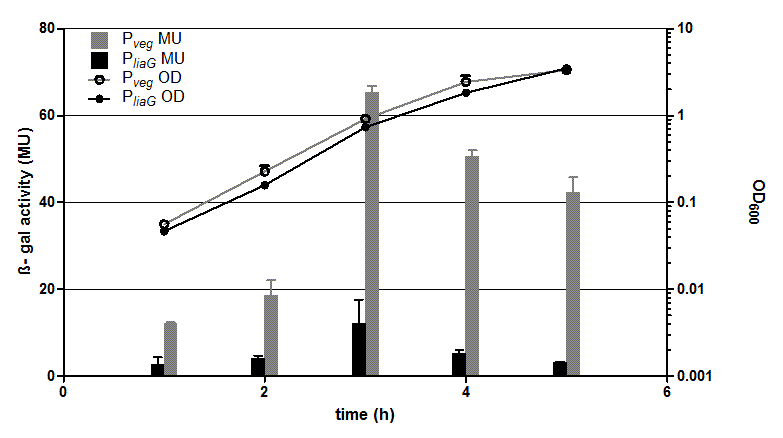Difference between revisions of "Part:BBa K823003"
(→Evaluation) |
(→Evaluation) |
||
| (16 intermediate revisions by 2 users not shown) | |||
| Line 7: | Line 7: | ||
===Usage and Biology=== | ===Usage and Biology=== | ||
<br> | <br> | ||
| − | <p align="justify"> | + | <p align="justify">P<sub>''veg''</sub> is known to show a strong constitutive activity during the vegetative growth phase and sporulation. This promoter is important for the transcription of the ''veg'' gene, which plays a role during sporulation [http://www.ncbi.nlm.nih.gov/pubmed?term=J.%20Biochem.%2C%20133%20%284%29%3A%20475%E2%80%93483: (Fukushima ''et al.'', 2003)]. P<sub>''veg''</sub> was measured by using the reporter gene ''lacZ''. For more Details visit the [http://2012.igem.org/Team:LMU-Munich/Data/Constitutive Data of the constitutive promoters] of the LMU-Munich Team 2012 or get an overview of our whole project [http://2012.igem.org/Team:LMU-Munich '''Bead'''zillus]. </p> |
<br> | <br> | ||
===Evaluation=== | ===Evaluation=== | ||
<br> | <br> | ||
| − | [ | + | This part was also evaluated in the publication [http://www.jbioleng.org/content/7/1/29 The ''Bacillus'' BioBrick Box: generation and evaluation of essential genetic building blocks for standardized work with ''Bacillus subtilis''] by Radeck ''et al.''. |
| + | |||
| + | ===β-galactosidase assay=== | ||
<br> | <br> | ||
| − | <p align="justify"> The two constitutive promoters P<sub>''liaG''</sub> and P<sub>''veg''</sub> were evaluated with the reporter vector | + | <p align="justify"> The two constitutive promoters '''P<sub>''liaG''</sub>''' and '''P<sub>''veg''</sub>''' were evaluated with the reporter vector pSB<sub>''Bs''</sub>1C-''lacZ'' which contains the lacZ reporter gene ('''Fig.1''').</p> |
| + | <br> | ||
| + | {| style="color:black;" cellpadding="3" width="70%" cellspacing="0" border="0" align="center" style="text-align:left;" | ||
| + | | style="width: 70%;background-color: #EBFCE4;" | | ||
| + | {| | ||
| + | |[[Image:Englisch_Auswertung_PliaG_Pveg.png|400px|center]] | ||
| + | |- | ||
| + | | style="width: 70%;background-color: #EBFCE4;" | | ||
| + | {| style="color:black;" cellpadding="0" width="100%" cellspacing="0" border="0" align="center" style="text-align:center;" | ||
| + | |style="width: 70%;background-color: #EBFCE4;" | | ||
| + | <font color="#000000"; size="2"><p align="justify"> '''Fig. 1: β-galactosidase assay and growth curve of strains carrying the promoters P<sub>''liaG''</sub> (black) and P<sub>''veg''</sub> (grey) fused to ''lacZ'''''. β-galactosidase activity (Miller Units) and the growth curve values are the average of two independent clones with their standard deviation. Experiment shows representative data from three independent experiments.</p></font> | ||
| + | |} | ||
| + | |} | ||
| + | |} | ||
| + | <br> | ||
| + | <p align="justify">Promoter activity leads to the expression of the β-galactosidase. The β-galactosidase assay of the constitutive ''Bacillus'' promoters P<sub>''veg''</sub> and P<sub>''liaG''</sub> was repeated three times. The graph shows data of one representative experiment. In the beginning of the growth curve both promoters show only low activity before it increases to a maximum before it decreases to the begininng level after about seven hours (Data not shown). Summing up, the course of activity of both promoters P<sub>''veg''</sub> and P<sub>''liaG''</sub> is very similar based on the growth curve. The highest β-galactosidase activity and therefore the highest activity of the promoter P<sub>''veg''</sub> with a maximum of 65 Miller units can be found during the transition from the logarithmic to the stationary phase. This is about five times higher than the acitivity of the promoter P<sub>''liaG''</sub> with a maximum activity of about 12 Miller Units. | ||
</p> | </p> | ||
| + | <br> | ||
<br> | <br> | ||
===Sequence and Features=== | ===Sequence and Features=== | ||
| + | This part was amplified from the genom of ''B. subtilis''. | ||
| + | |||
<partinfo>BBa_K823003 SequenceAndFeatures</partinfo> | <partinfo>BBa_K823003 SequenceAndFeatures</partinfo> | ||
Latest revision as of 16:56, 3 February 2014
Pveg
Pveg is a strong, constitutive promoter of Bacillus subtilis.
Usage and Biology
Pveg is known to show a strong constitutive activity during the vegetative growth phase and sporulation. This promoter is important for the transcription of the veg gene, which plays a role during sporulation [http://www.ncbi.nlm.nih.gov/pubmed?term=J.%20Biochem.%2C%20133%20%284%29%3A%20475%E2%80%93483: (Fukushima et al., 2003)]. Pveg was measured by using the reporter gene lacZ. For more Details visit the [http://2012.igem.org/Team:LMU-Munich/Data/Constitutive Data of the constitutive promoters] of the LMU-Munich Team 2012 or get an overview of our whole project [http://2012.igem.org/Team:LMU-Munich Beadzillus].
Evaluation
This part was also evaluated in the publication [http://www.jbioleng.org/content/7/1/29 The Bacillus BioBrick Box: generation and evaluation of essential genetic building blocks for standardized work with Bacillus subtilis] by Radeck et al..
β-galactosidase assay
The two constitutive promoters PliaG and Pveg were evaluated with the reporter vector pSBBs1C-lacZ which contains the lacZ reporter gene (Fig.1).
|
Promoter activity leads to the expression of the β-galactosidase. The β-galactosidase assay of the constitutive Bacillus promoters Pveg and PliaG was repeated three times. The graph shows data of one representative experiment. In the beginning of the growth curve both promoters show only low activity before it increases to a maximum before it decreases to the begininng level after about seven hours (Data not shown). Summing up, the course of activity of both promoters Pveg and PliaG is very similar based on the growth curve. The highest β-galactosidase activity and therefore the highest activity of the promoter Pveg with a maximum of 65 Miller units can be found during the transition from the logarithmic to the stationary phase. This is about five times higher than the acitivity of the promoter PliaG with a maximum activity of about 12 Miller Units.
Sequence and Features
This part was amplified from the genom of B. subtilis.
- 10COMPATIBLE WITH RFC[10]
- 12COMPATIBLE WITH RFC[12]
- 21COMPATIBLE WITH RFC[21]
- 23COMPATIBLE WITH RFC[23]
- 25COMPATIBLE WITH RFC[25]
- 1000COMPATIBLE WITH RFC[1000]

